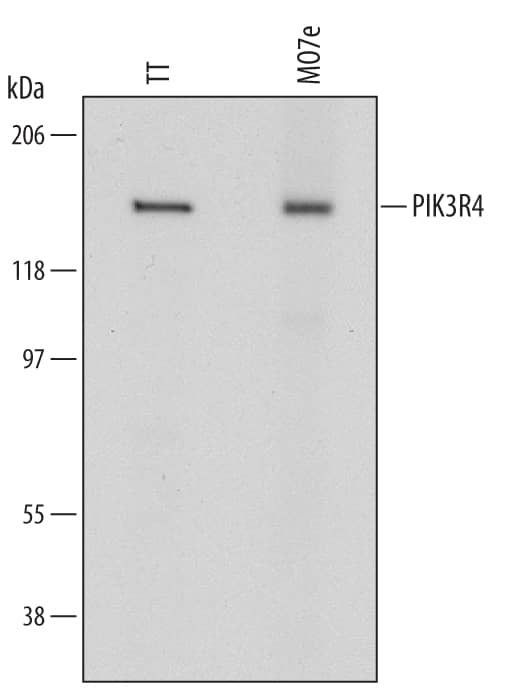PIK3R4 Products
Phosphoinositide-3-Kinase, Regulatory Subunit 3 (PIK3R4), also known as Vacuolar Protein Sorting 15 (Vps15), is a 1358 amino acid (aa) protein with a predicted molecular weight of approximately 150 kDa. The human protein shares 96% aa sequence identity with the mouse and rat orthologs. Myristoylated PIK3R4 associates with membranes and regulates the activity of hVps34, the catalytic component of PI 3-Kinase complexes that catalyze the formation of phosphatidylinositol 3-phosphate [PI(3)P]. The PI(3)P modification is known to have roles in autophagy and vesicular trafficking. Accordingly, PIK3R4 may have a role in the trafficking of mATG9 from the Golgi to phagophores and autophagosomes. PIK3R4 may also be recruited to autophagosomes in a SLAM-dependent manner following exposure to gram-negative bacteria. Mutations in PIK3R4 have been found in metastatic melanoma and PIK3R4 gene copy number increases are associated with decreased survival in patients with ovarian tumors, suggesting that PIK3R4 may function in cancer.
36 results for "PIK3R4" in Products
36 results for "PIK3R4" in Products
PIK3R4 Products
Phosphoinositide-3-Kinase, Regulatory Subunit 3 (PIK3R4), also known as Vacuolar Protein Sorting 15 (Vps15), is a 1358 amino acid (aa) protein with a predicted molecular weight of approximately 150 kDa. The human protein shares 96% aa sequence identity with the mouse and rat orthologs. Myristoylated PIK3R4 associates with membranes and regulates the activity of hVps34, the catalytic component of PI 3-Kinase complexes that catalyze the formation of phosphatidylinositol 3-phosphate [PI(3)P]. The PI(3)P modification is known to have roles in autophagy and vesicular trafficking. Accordingly, PIK3R4 may have a role in the trafficking of mATG9 from the Golgi to phagophores and autophagosomes. PIK3R4 may also be recruited to autophagosomes in a SLAM-dependent manner following exposure to gram-negative bacteria. Mutations in PIK3R4 have been found in metastatic melanoma and PIK3R4 gene copy number increases are associated with decreased survival in patients with ovarian tumors, suggesting that PIK3R4 may function in cancer.
| Reactivity: | Human, Mouse, Rat, Zebrafish, Fish - Danio rerio (Zebrafish) |
| Details: | Rabbit IgG Polyclonal |
| Applications: | WB, ICC/IF, IP |
| Reactivity: | Human |
| Details: | Mouse IgG2a Monoclonal Clone #576514 |
| Applications: | WB |
| Reactivity: | Human, Mouse, Monkey |
| Details: | Mouse IgG2a Kappa Monoclonal Clone #1B5 |
| Applications: | IHC, WB, ELISA, ICC/IF |
Recombinant Monoclonal Antibody
| Reactivity: | Human, Mouse, Rat |
| Details: | Rabbit IgG Monoclonal Clone #5J3U5 |
| Applications: | WB, ICC/IF |
Recombinant Monoclonal Antibody
| Reactivity: | Human, Mouse, Rat |
| Details: | Rabbit IgG Monoclonal Clone #SR1197 |
| Applications: | IHC, WB, ICC/IF, Flow |
| Reactivity: | Human, Mouse |
| Details: | Mouse IgG2a Kappa Monoclonal Clone #1G12 |
| Applications: | WB, ELISA |
| Reactivity: | Human |
| Details: | Mouse IgG2a Kappa Monoclonal Clone #1D4 |
| Applications: | WB, ELISA, KD |
| Reactivity: | Human |
| Details: | Rabbit IgG Polyclonal |
| Applications: | IHC, WB |
| Reactivity: | Human |
| Details: | Rabbit IgG Polyclonal |
| Applications: | IHC, ICC/IF |
| Reactivity: | Human |
| Details: | Rabbit IgG Polyclonal |
| Applications: | IP, WB (-) |
| Reactivity: | Human, Rat |
| Details: | Mouse IgG2a Kappa Monoclonal Clone #1H7 |
| Applications: | WB, ELISA |
| Reactivity: | Human, Rat |
| Details: | Mouse IgG2a Kappa Monoclonal Clone #2A6 |
| Applications: | WB, ELISA |
| Reactivity: | Human |
| Details: | Rabbit IgG Polyclonal |
| Applications: | IP, WB (-) |
| Applications: | AC |
| Reactivity: | Human |
| Details: | Rabbit IgG Polyclonal |
| Applications: | IP, WB (-) |
| Reactivity: | Human |
| Details: | Rabbit IgG Polyclonal |
| Applications: | IP, WB (-) |
| Reactivity: | Human |
| Details: | Rabbit IgG Polyclonal |
| Applications: | IP, WB (-) |
| Reactivity: | Human |
| Details: | Rabbit IgG Polyclonal |
| Applications: | IP, WB (-) |
| Reactivity: | Human |
| Details: | Rabbit IgG Polyclonal |
| Applications: | IP, WB (-) |
| Reactivity: | Human |
| Details: | Rabbit IgG Polyclonal |
| Applications: | IP, WB (-) |
| Reactivity: | Human |
| Details: | Rabbit IgG Polyclonal |
| Applications: | IP, WB (-) |
| Reactivity: | Human |
| Details: | Rabbit IgG Polyclonal |
| Applications: | IP, WB (-) |
| Reactivity: | Human |
| Details: | Rabbit IgG Polyclonal |
| Applications: | IP, WB (-) |
| Reactivity: | Human |
| Details: | Rabbit IgG Polyclonal |
| Applications: | IP, WB (-) |
| Reactivity: | Human |
| Details: | Rabbit IgG Polyclonal |
| Applications: | IP, WB (-) |

![Western Blot: PIK3R4 Antibody [NBP1-30463] Western Blot: PIK3R4 Antibody [NBP1-30463]](https://resources.bio-techne.com/images/products/PIK3R4-Antibody-Western-Blot-NBP1-30463-img0002.jpg)


![Western Blot: PIK3R4 Antibody (1B5) [H00030849-M02] Western Blot: PIK3R4 Antibody (1B5) [H00030849-M02]](https://resources.bio-techne.com/images/products/PIK3R4-Antibody-1B5-Western-Blot-H00030849-M02-img0010.jpg)
![Western Blot: PIK3R4 Antibody (5J3U5) [NBP3-16612] Western Blot: PIK3R4 Antibody (5J3U5) [NBP3-16612]](https://resources.bio-techne.com/images/products/PIK3R4-Antibody-5J3U5-Western-Blot-NBP3-16612-img0003.jpg)
![Western Blot: PIK3R4 Antibody (SR1197) [NBP3-22308] -](https://resources.bio-techne.com/images/products/nbp3-22308_rabbit-pik3r4-mab-sr1197-5720231552181.jpg)
![Western Blot: PIK3R4 Antibody (1G12) [H00030849-M03] Western Blot: PIK3R4 Antibody (1G12) [H00030849-M03]](https://resources.bio-techne.com/images/products/PIK3R4-Antibody-1G12-Western-Blot-H00030849-M03-img0004.jpg)
![Western Blot: PIK3R4 Antibody (1D4) [H00030849-M01] Western Blot: PIK3R4 Antibody (1D4) [H00030849-M01]](https://resources.bio-techne.com/images/products/PIK3R4-Antibody-1D4-Western-Blot-H00030849-M01-img0007.jpg)
![Western Blot: PIK3R4 Antibody [NBP1-82451] Western Blot: PIK3R4 Antibody [NBP1-82451]](https://resources.bio-techne.com/images/products/PIK3R4-Antibody-Western-Blot-NBP1-82451-img0005.jpg)
![Immunocytochemistry/ Immunofluorescence: PIK3R4 Antibody [NBP2-38276] Immunocytochemistry/ Immunofluorescence: PIK3R4 Antibody [NBP2-38276]](https://resources.bio-techne.com/images/products/PIK3R4-Antibody-Immunocytochemistry-Immunofluorescence-NBP2-38276-img0004.jpg)

![Western Blot: PIK3R4 Antibody (1H7) [H00030849-M04] Western Blot: PIK3R4 Antibody (1H7) [H00030849-M04]](https://resources.bio-techne.com/images/products/PIK3R4-Antibody-1H7-Western-Blot-H00030849-M04-img0002.jpg)
![Western Blot: PIK3R4 Antibody (2A6) [H00030849-M05] Western Blot: PIK3R4 Antibody (2A6) [H00030849-M05]](https://resources.bio-techne.com/images/products/PIK3R4-Antibody-2A6-Western-Blot-H00030849-M05-img0002.jpg)
![Immunoprecipitation: PIK3R4 Antibody [NBP1-30462] Immunoprecipitation: PIK3R4 Antibody [NBP1-30462]](https://resources.bio-techne.com/images/products/PIK3R4-Antibody-Immunoprecipitation-NBP1-30462-img0001.jpg)